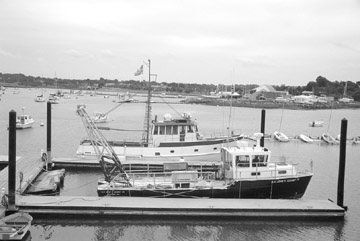As many programs and projects at UMass Boston struggle to sink or swim due to budget cutbacks, one is managing to stay afloat: a plan to build a new boat to replace the aging trawler-style one the University currently leases.
“It’s one of those things that everybody raises their eyebrow at,” says David MacKenzie, vice chancellor of administration and finance, adding that it won’t have a negative impact on the budget.
Chris Sweeney, director of the Division of Marine Operations, says it’s a “self-funding proposition” with “no capital outlay” from the university. The project would put Marine Operations in debt for close to ten years, starting this year. Costs are projected to rise into the $800,000 to $900,000 range. Marine Operations will be looking towards fundraising and applying for grants and loan packages to help offset costs.
“It’s a hard time to be talking up a new boat,” says Sweeney. “People tend to think it’s frivolous, and it’s not. It’s part of our long-range plans.”
Administration officials cite several reasons in support of acquiring of “the first real UMass Boston boat,” tentatively called the Columbia Point.
The Division of Marine Operations, created in 1990, has grown almost ten percent per year “both in the size of its facilities and the services provided with demand now exceeding capacity,” according to a proposal obtained by The Mass Media. The proposal argues that, “In order to keep up with the growing demand and changing conditions of our market, [Division of Marine Operations] is looking to obtain a new vessel.”
The current boat, the thirty-six year old Hurricane, is leased to UMass Boston from the Thompson Island Outward Bound Education Center. The proposal contains many complaints about the Hurricane, including its fishing boat-like layout (it was designed by a fisherman) that’s “not conducive for entertaining or indoor learning,” Coast Guard-required inspections which lead to repairs costing nearly $20,000 a year, and outdated technology. Because of deteriorating conditions, operations have had to be scaled back.
Another complaint is that the “floating classroom” can only hold 48 passengers, while the Columbia Point will supposedly have capacity for 110. Four thousand people a year get taken out on the Hurricane, Sweeney says. He hopes to double it.
The only other boat, the John F. Looney Jr., while “a wonderful compliment to our in-shore fleet,” and good for small school groups, “is not suitable for long-range work such as a whale watches due to her mechanical limitations.”
Marine Operations is also hoping to make the Columbia Point an environmentally friendly boat, using recycled lumber, and a bio-diesel propulsion engine. “We’ve got reports [the engine] has low wear and tear,” Sweeney said on the feasibility of using bio-diesel, adding that it apparently “smells like French fries out of the exhaust pipe.”
The Columbia Point is expected to be online by the early summer of next year, just in time for the Democratic National Convention when it comes to Boston. “We can anticipate some involvement of our fleet,” the proposal states, adding that “opportunities for fundraising and showcasing University facilities” could amount to as much as $3,000.
Included in the proposal’s market analysis section is the fact that there isn’t “one major player in the on-water education field in and around Boston Harbor.”
“Presently, colleges and universities in the Boston area look to places as far off as Woods Hole Oceanographic Institute on Cape Cod to satisfy their on-water programming,” it says. “This leaves the door wide open for a state-of-the-art vessel equipped to serve as a teaching platform. A well-conceived marketing campaign targeted at the area’s wealth of institutes of learning, including middle schools, high schools, colleges and universities could potentially bring a wealth of business to a vessel of this type.”
Due to budget cutbacks, the one program that served kindergarten through twelfth grade and provided educational harbor cruises, Harbor Explorations has been eliminated, leaving an educational void the new boat could fill.
Another harbor program which came close to getting cut was UMass Boston’s Sailing Program, which provides sailing opportunities to alumni, staff, faculty, and students. After a letter-writing campaign materialized in support of the program, a final budget report from Chancellor Gora stated that Athletic Director Charlie Titus said the department could absorb the cuts.
Tom Walsh, sail master for the sailing program, says he met with Chancellor Jo Ann Gora, the provost, various vice chancellors, and student leaders. “The outcome of the meeting was that the athletic director stated that we would keep the sailing program but we were going to have to find ways to increase our revenues.”
“The mission of the sailing program is to provide recreational activity to UMB students, and we’re willing to work however we can to make sure students have that access because they already paid for it,” he said.
The program will be looking at creative ways and outside sources, says Walsh. The program has already reduced expenses by using donated boats. A new boat hasn’t been bought in twenty years.
The University has to “maintain a presence in the harbor,” says Vice Chancellor MacKenzie, who also co-chaired the CURE Committee. “We’re very much a part of the Boston Harbor. We want UMass Boston to be part of the marine and island experience.”
Marine Operations’ new boat is still in the design stages, with no final drawing as of yet.
“We’re not really connected to the ocean, in this ideal location,” says Sweeney. “My goal is to get everyone out on the water.”





















































